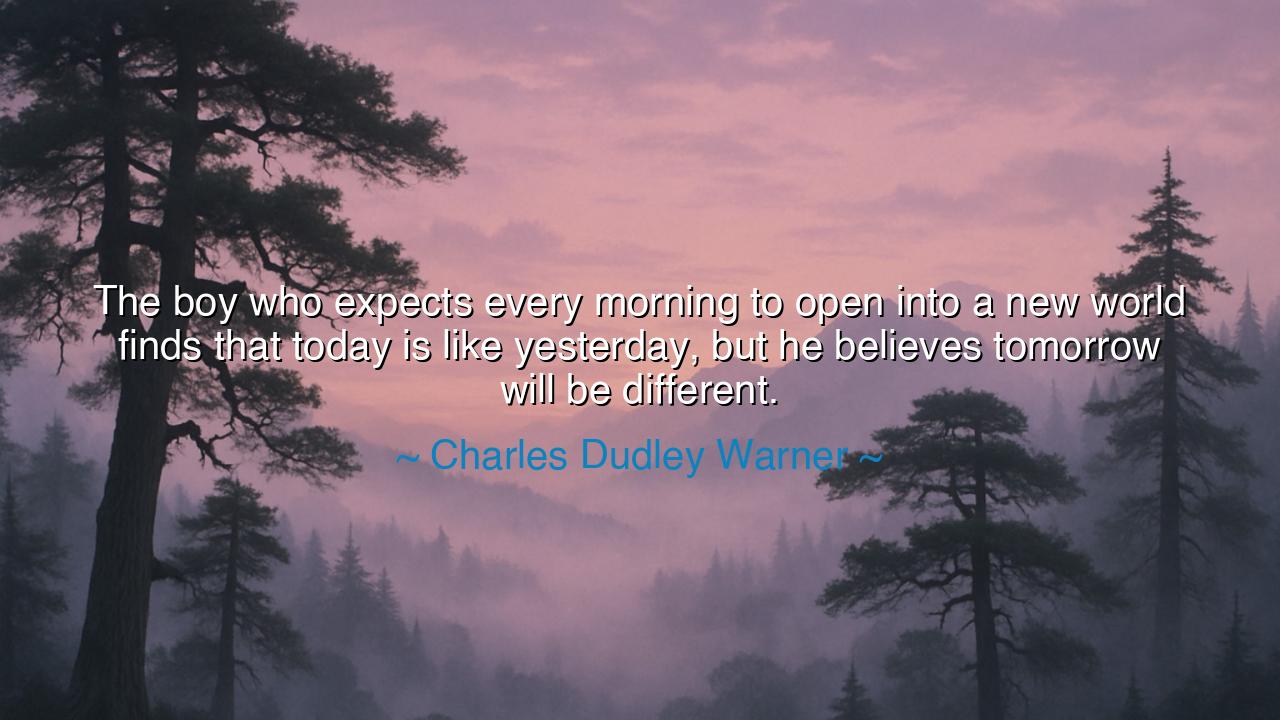
The boy who expects every morning to open into a new world finds
The boy who expects every morning to open into a new world finds that today is like yesterday, but he believes tomorrow will be different.






“The boy who expects every morning to open into a new world finds that today is like yesterday, but he believes tomorrow will be different.” Thus wrote Charles Dudley Warner, the American essayist and contemporary of Mark Twain, whose words speak with the bittersweet rhythm of life’s expectations. At first, the sentence feels like a sigh—a recognition that the world rarely shifts as swiftly as youthful hope demands. Yet hidden within it is also a quiet celebration: the enduring power of hope, the refusal of the human spirit to surrender to sameness, the insistence that tomorrow holds the promise of renewal.
The origin of this saying lies in Warner’s meditations on human nature and the condition of society. He observed how the young, filled with eagerness, believe that each dawn will reveal a wholly transformed world, only to find repetition, routine, and familiar struggle. And yet—rather than despair—they carry on with the conviction that change lies just ahead. Warner captures both the innocence and resilience of youth: the disappointment of today, and the undimmed belief in tomorrow.
The ancients, too, pondered this rhythm of life. In Ecclesiastes, the preacher declares, “There is nothing new under the sun,” a reminder that the days pass in familiar cycles. Yet in the Psalms, we also hear: “Weeping may endure for the night, but joy comes in the morning.” Here is the paradox Warner speaks of: life appears repetitive, yet the heart dares to believe in renewal. To live without such hope is despair; to live with it is the secret of endurance.
History gives us vivid examples. Consider Christopher Columbus, who for months sailed the unchanging waters of the Atlantic. Each day the horizon looked the same, the sea unbroken, the promise of land unmet. Many grew weary, but Columbus clung to the hope of tomorrow—and at last, a new world appeared before his eyes. His journey illustrates Warner’s wisdom: though today may mirror yesterday, it is the faith in tomorrow that carries us into discovery.
From this we learn that expectation is both a burden and a gift. To wake each day hoping for transformation and finding sameness can weary the heart. Yet the deeper truth is that such hope drives us forward, sustaining us through the long seasons of waiting. The boy who believes tomorrow will be different is not foolish—he is wise in the way of the soul, for hope is the seed from which change eventually blossoms. Without it, there would be no progress, no discovery, no striving toward better things.
Practical wisdom follows: in your own life, do not lose heart when today feels no different than yesterday. Change rarely comes in sudden bursts; it is often hidden, growing silently beneath the surface. Train your eyes to see not only what has not changed, but also the small movements toward growth. Cultivate patience, but do not surrender your tomorrow-hope, for it is that very belief that prepares you to recognize and seize the moment when transformation does come.
Thus, remember Warner’s words: “Today is like yesterday, but he believes tomorrow will be different.” Let them remind you that life is a mixture of repetition and renewal, of sameness and surprise. If you find yourself weary of the cycles, do not despair. Lift your eyes toward tomorrow, and carry within you the hope that makes endurance possible. For it is the hope of tomorrow that has carried generations through hardship, and it is this same hope that will lead you, too, into your new world.






AAdministratorAdministrator
Welcome, honored guests. Please leave a comment, we will respond soon